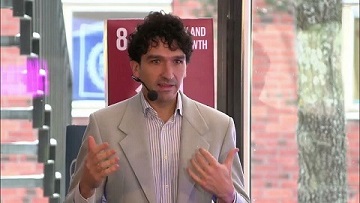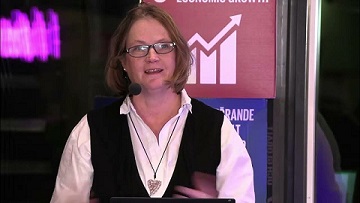KTH Africa Days Event: Fostering Collaboration and Sustainability
In a bid to underscore its dedication to fostering collaboration and sustainable development initiatives across Africa, the Royal Institute of Technology (KTH) recently hosted its much-anticipated Africa Days event through the Global Development Hub. The event, spanning four days, served as a platform for visualizing KTH's multifaceted activities on the African continent, with a keen focus on education, research, and innovation ventures.
The division of Energy Systems (KTH-dES) was deeply involved in the event, sharing its main research activities in the continent. The division’s participation included presenting several posters spanning from energy access research for electrification and clean cooking planning in Sub Sahara Africa (SSA), to Climate Land Energy and Water systems analysis in SSA countries and in cross boundary river basins. Moreover, KTH-dES’s researchers participated as keynote speakers in the event.
Climate planning and sustainable energy access
Francesco Fuso Nerini , associate professor at KTH-dES and director of the KTH Climate Action Center presented on the first day of the event. Francesco’s expertise in sustainable development and climate action promised an enriching discourse on KTH's research efforts in climate planning and sustainable energy access.

In his session, Francesco delved into KTH's collaborative efforts to address climate change challenges comprehensively, highlighting key projects and partnerships driving sustainable development in the region. Through the KTH Climate Action Center and KTH-dES, Francesco showed how over 100 researchers across various disciplines unite to bridge critical gaps for effective climate action. From sustainable development goals-based planning to research on energy access, KTH's endeavors aim to provide data-driven solutions to inform policy strategies and promote cleaner, more sustainable practices. Francesco also discussed KTH's innovative approaches and strategic collaborations with international partners, including the World Bank and United Nations agencies. Through these efforts, KTH-dES remains committed to driving positive change and advancing sustainability efforts in Africa and beyond.
Watch the complete presentation by Francesco on youtube
EPIC Africa – Sustainable Water, Energy & Food Pathways for Sub-Saharan Africa
Viktoria Martin , a professor in energy technology and head of KTH-dES, and Francesco Gardumi , researcher at KTH-dES, presented the EPIC Africa project on the second day of the event. With Africa's abundant resources and rich culture as inspiration, the project focuses on Energy planning and modeling through an integrated assessment of the climate-land-energy-water nexus (CLEWs) in Sub-Saharan Africa. Funded by Horizon Europe in collaboration with the African Union, the project examines the VOLTA and TANA river basins, which arecrucial resources for the countries they traverse. The partnership includes KTH, coordinated by TUDelft, along with Belgian, Burkinabe, Ghanaian, and Kenyan institutions, aiming to enhance clean energy generation while addressing complex environmental challenges.

In their talk, Viktoria and Francesco explained how the project aims to provide insights for energy planning by assessing the interconnected climate, land, energy, and water systems, emphasizing the importance of considering multiple resources to avoid competition and ensure sustainability. Viktoria highlighted the need for enhancing local expertise and engaging stakeholders in the process. In the project, a transition space is fostering dialogue to prioritize research areas and inform modeling efforts. By integrating environmental, social, and economic considerations, the project seeks to address trade-offs and support decision-making for sustainable development. The establishment of the EPIC CLEWs Data Observatory , and the EPIC Africa research network further underscores the project's commitment to collaboration and knowledge-sharing beyond the consortium, aiming for lasting positive impacts on energy and environmental sustainability in Africa.
Watch the complete talk on EPIC Africa on youtube
